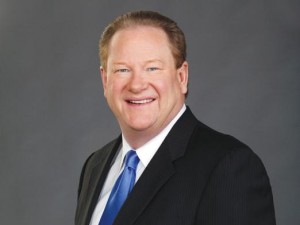 “Why can’t we have health care?”
“Why can’t we have health care?”
Frank Lewis is in his 50s, and he’s talking to MSNBC’s Ed Schultz in the convention center. Schultz, host of The Ed Show on weeknights, is walking around in black slacks and a black short-sleeved shirt with a camera crew listening to comments and concerns from people who are attending a free health care clinic organized by the National Association of Free Clinics. It’s the sixth anniversary of Hurricane Katrina, and a man in bib-front overalls and a camouflage baseball cap tells Schultz that he’s there for blood pressure medicine and anti-anxiety pills – things he’s done without since the clinic was last here more than a year ago.
Hall H has been transformed into a massive, all-volunteer clinic to handle mental and physical needs. Over the course of the day, it will see more than 1,000 patients, 63 percent of whom are out of work and half of whom haven’t seen a doctor since the last free clinic. Some, like Frank Lewis, are clearly outraged that they have to endure physical ailments and put off treatments because they can’t afford it and don’t have health insurance.
“This is my eighth clinic that I’ve been to,” Schultz says. “People on hard times who can’t get to a doctor or can’t afford it. They’re scared. This is a hard thing to do, to go to a clinic. It’s very personal.” In fact, five people will be diagnosed with cancer before the day is done. “You go to any city in America and you’re going to get the same story. This is a poster child for what’s really going on in America.”
The volunteer doctors and health care workers come from across North America, and they include a mother and daughter from Calgary. After Schultz publicized this clinic on his show, one group, RX Outreach, agreed to provide three months of free prescriptions for attendees at the clinic. According to executive director Nicole Lamoureaux from Alexandria, Virginia, many of the health care professionals enjoy the experience despite the temporary nature of the set-up. “They’re allowed to practice medicine the way they intended,” Lamoureaux says, free from the restrictions placed on them by insurers and corporate hospitals.
Schultz – the populist yin on MSNBC to Rachel Maddow’s policy wonk yang – broadcasts live from the Convention Center that night, and he gets a hero’s welcome as he walks the floor. Many volunteers stop him to pose together for photos. “Thanks for fighting for us, Ed,” one woman calls out as he walks away.
“[Republicans] have fought Obamacare, but they’re not with the people, ” Schultz says. “They’re with big corporations. Our political system right now does not fit health care in America. To President Obama and the Democrats’ credit, they got something done, but we have a very long way to go to make it right.”
Schultz has been actively involved in the Gulf South’s post-Katrina recovery. When he was a radio talk show host working out of Fargo, North Dakota, he helped relocate eight displaced New Orleanians to Fargo shortly after the storm, and raised more than $100,000 from his listeners to help with the recovery.
“”The recovery of New Orleans has to start with the recovery of its people,” he says. “If you have a lot of people who don’t have access to medical care, a lot of people who don’t have the money to see a doctor, it’s going to be hard for your city to recover. There have been tremendous strides, but we still have a long way to go.”
Although Schultz sees important changes to health care coming with what has come to be known as “Obamacare” – no denying coverage because of pre-existing conditions, insurance companies can’t drop people who become sick, younger people being able to stay on their parents’ policies until they’re 26 – he’s not satisfied with the results, nor the effort of some Democrats to bring about health care change.
“I don’t understand how some Democrats acted during the health care debate,” he says. “Universal health care was never on the table. Public option was never, in my opinion, seriously considered. A lot of it was quarterbacked by Big Insurance and big corporations that simply want a for-profit system. They were pulling the wool over the eyes of the American people regarding what kind of results we’re actually getting.”
FOne woman at the clinic was sent to it by a local hospital who warned that her wait at the hospital would be seven hours. Another patient received a complete work-up in 20 minutes, but the fact that free clinics such as these are necessary upsets Nicole Lamoureaux. “If you think the health care debate is over, you’re wrong,” she says. “It’s just begun.”
Visit msnbc.com for breaking news, world news, and news about the economy
Schultz with Rep. Cedric Richmond on the floor of the Convention Center.
Visit msnbc.com for breaking news, world news, and news about the economy
Schultz with Nicole Lamoureaux and Dr. Rani Whitmore.




